- Home
- Stacia Deutsch
Ben Franklin’s Fame Page 2
Ben Franklin’s Fame Read online
Page 2
Sounded easy to me. Ben Franklin would be back in our social studies textbooks in no time at all.
Our teacher turned to Bo. “Have you read about Ben Franklin?” Being shy and all, Bo simply nodded. “Biographies? His autobiography?” Mr. C asked. Bo nodded twice, meaning he’d read both types of books. “Good. Your knowledge is going to help a lot on this adventure.”
Mr. C handed Jacob the computer and cartridge. “For this mission, you won’t need to adjust the settings on the computer. However, the cartridge might need some tweaking.” He handed Jacob a small screwdriver. “Open the back panel on the cartridge. You’ll know what to do.” Then he warned, “Don’t take off the lid, though. You don’t want the cartridge to explode.”
“Explode?” Zack burst out. “You mean Jacob could blow us up?”
Jacob looked concerned, but he said with confidence, “I won’t blow us up.”
“I trust you,” Mr. C said firmly.
“Now, Zack,” Mr. C said, and put his arm around Zack’s shoulder, “you are the one who needs to convince Ben Franklin to get his life back on the correct course.”
“Why me? Why would he listen to me?” Zack asked, his shoulders growing tight.
“Because you two have a lot in common,” Mr. C concluded.
Zack glanced up at Mr. C. “Did he want to be a potter? Tomorrow, I’m going to try Pottery Club, remember?”
“As a matter of fact”—Mr. C smiled, walking over to his workbench—“Ben Franklin did try making ceramics for a while.” At that, Zack’s shoulders softened and a glint of light passed through his eyes.
“All right, then,” Mr. C told us. “You’d better get going. Good-bye and good luck.” He leaned over a cardboard box and began sorting purple and orange wires into two piles.
Jacob slipped the cartridge into the back of the computer. The green time-travel hole opened in the middle of the floor. Glowing smoke was slithering like a snake across the cement. Jacob, Zack, and Bo jumped in, one after the other.
I was the only kid left in the laboratory.
“Hey, Mr. C.” I was watching the hole carefully so that it didn’t close before I jumped. “What about me? How are my skills going to come in handy?”
I am bold and curious. Those are my skills. I wanted to be useful, too.
Mr. C smiled and walked quickly around his workbench. “Good thing you asked. In my hurry to get you kids going, I forgot to give you this.” He handed me a small notebook with a slick cover and a matching pencil. “Abigail, you always have a lot of questions,” he said. “Think like a detective.”
Mr. C pointed at the time-travel hole and said, “You’re going to Philadelphia for the signing of the Declaration of Independence. You’ll land at Independence Hall, near the Liberty Bell. The boys are already there.”
1776
“How cool is that!?” I said. It wasn’t a question, but rather a statement made in total awe.
We had landed in a large town square. Standing before us was a tall, three-story, brick building. I guessed that this was Independence Hall, like Mr. C had said. There was a balcony off the front. And a tower on the roof. A huge brass bell hung in the tower. It was the bell that made me exclaim again, “Totally cool!”
I told the boys what Mr. C had said. We were at Independence Hall in Philadelphia and that was the Liberty Bell.
“I’m ahead of you, Abigail,” Bo told me. “I’ve never been here before, but I read about the Liberty Bell in one of those books on Ben Franklin. He lived near here.”
We knew we needed to go find Ben Franklin, but couldn’t resist checking out the Liberty Bell for a few more seconds. Nowhere on earth was there another bell like it. The Liberty Bell was the most important bell in United States history.
“Jacob and I came to Philadelphia once with Mom and Dad,” Zack said. “The Liberty Bell was in a special building for tourists. We had to stand in line for almost an hour to see it. By the time we got to the front of the line, the dumb bell was cracked. All that waiting to see a broken bell,” Zack complained.
I knew Zack was kidding. Not about the wait, but about the crack. Everyone knew that the Liberty Bell was cracked. Seeing the crack was part of the reason people stood in line. It was a really famous crack.
Bo explained, “No one knows for sure when the bell got cracked. Some people think it was in 1846, when it was rung in honor of George Washington’s birthday. Others think the bell cracked a long time before then.”
One thing was certain: We were in 1776 and there was no crack in the Liberty Bell. Not yet.
I took a good look around where we were standing. The town square was crowded with people. I could tell something important was about to happen. The air had that electric buzz when people are gathering for a really exciting event. Maybe the bell was about to ring?
I closed my eyes for a second. I could almost hear the booming sound a bell that big would have made. “Cool,” I said one more time. I opened my eyes. “It’s so awesome to be here for the very first Fourth of July celebration.”
“Hey!” Jacob had a puzzled look on his face. “The computer says the date isn’t July fourth,” he reported. “It’s August second, 1776.”
“That’s weird,” I commented.
“The time-travel computer must be broken. We’ve missed the signing of the Declaration of Independence,” Zack muttered. “We’ll never find Ben Franklin now.”
“No, no. The computer works perfectly,” Bo cheered. “We’re right on time.”
I was really confused about the date. Since I was supposed to be thinking like a detective, I felt like I should be writing stuff down. I pulled out my new notepad and pencil. On a clean piece of paper I wrote the date: August 2, 1776.
“I can explain,” Bo began. I wrote down what he said. “You see, the Declaration of Independence was written at a time when America was in a huge fight with Britain. Britain had been controlling the thirteen colonies, but the colonies wanted to rule themselves. While the Revolutionary War was being fought by soldiers in other places, here in Philadelphia, Ben Franklin and four other men were secretly creating a document proclaiming America’s freedom.”
I was writing so fast, my hand was cramping.
Bo went on. “After many drafts, the Declaration of Independence was completed and voted on by a group of leaders on July second, 1776. These men were called the Second Continental Congress.” Bo pointed up at the Liberty Bell. “On July eighth, the Liberty Bell was rung for freedom. And on August second, 1776, the Declaration of Independence was finally signed by the members of the Continental Congress.”
“Well,” Jacob said, tucking the computer into his pocket for safekeeping, “that explains why we are here in August.” He fanned himself with his hand. “It sure is a hot day.”
Zack wrinkled his face until his eyebrows touched each other. “I don’t understand. Why do we have barbeques on July fourth instead of August second? And set off fireworks? And march in parades? And—”
“We get your point,” Jacob tried to cut him off, but Zack kept on going.
“And go to baseball games? And eat hot dogs and apple pie—” Zack probably would have gone on all day, but Jacob flicked him in the head, saying, “Enough already.”
For the second time today, Bo stepped between them. He obviously wasn’t going to let them argue anymore. “It says July fourth, 1776, on the top of the Declaration,” Bo told the twins. “That’s the day it was accepted by Congress and printed, but not the day it was signed.”
I took one last look at the Liberty Bell and felt a surge of pride.
We were about to meet the famous Ben Franklin! Maybe we’d even get to see him sign the Declaration of Independence. All we had to do was find him first.
“What does Ben Franklin look like?” I quickly asked Bo.
Bo gave us a description of Ben Franklin. “He was the oldest member of the Second Continental Congress.” We were looking for a seventy-year-old man with a round face and a balding head.
I didn’t see anyone like that.
The crowd was growing as more and more people were coming into the square. Men were wearing long jackets, tight pants, and shoes with big buttons on the toes. It was hard to tell who was balding and who wasn’t since some men wore wigs. Most had hats on.
The women all wore long dresses. They carried parasols to shade themselves from the sun.
Everyone looked so formal. My jeans were new and had a neat sparkly design on them, but I still felt like I wasn’t fancy enough to fit in.
I flipped to a blank page in my notebook and went up to a woman standing nearby. She was looking up at the balcony of Independence Hall.
“What are you watching for?” I asked, noticing that everyone around us was staring up at the same balcony.
“I am simply waiting,” she replied, moving her parasol slightly to share her shade with me. The shade felt great. What a nice woman! “The Second Continental Congress has gathered inside the State House,” she told me. Waving her arm around at the crowd, she said, “We are all waiting for word that the Declaration of Independence has been signed.”
I wrote down the words “State House,” then asked the woman where that was.
The woman looked at me as if I were crazy and pointed at Independence Hall. I suddenly understood. I wrote down that in 1776, Independence Hall was called the State House.
If the Second Continental Congress was meeting right now, that meant Ben Franklin should be inside the State House with them. I wanted to be certain, so I asked, “Have you seen Benjamin Franklin today? It is very important that we find him.”
Bo, Jacob, and Zack gathered around to hear the woman’s reply.
“I have never heard the name you speak,” she said with a small shake of her head. “Is Mr. Franklin from Philadelphia?”
I didn’t know the answer.
Bo said softly, “No. He’s from Boston, but he lives here now.” She had to lean in to hear Bo speak. Bo spoke a tiny bit louder when he added, “Ben Franklin is definitely signing the Declaration of Independence today. He’s one of nine people representing the State of Pennsylvania.”
The woman thought about Bo’s words, then said, “I truly wish I could help you. I know the names of all fifty-six people signing the Declaration. But I have never heard of a Mr. Benjamin Franklin.”
I thanked her and started to close my notebook. This was going to be harder than I expected. Drat that Babs Magee. What had she done to Ben Franklin?
Before I shut the notebook entirely, I turned back to the woman. “What’s your name?” I asked, telling her I’d like to be able to remember her. She was very kind.
“Deborah Read,” she replied, then pulled back her parasol and moved forward into the crowd, away from us.
Bo looked pale.
“What’s up?” I asked.
“What’s up?” Jacob and Zack echoed me.
Bo could barely speak. “This is terrible,” he choked out.
“What?!” Jacob, Zack, and I shouted at the same time.
Bo took a few shallow breaths and stammered, “That woman . . . Deborah Read . . . she is Ben Franklin’s wife.”
“I think we should say, Deborah Read was Ben Franklin’s wife,” Zack corrected. “We’re stuck in a new version of American history. The world according to Babs Magee.”
One thing was painfully clear: We had to find Ben Franklin. He had to sign the Declaration of Independence or else Babs would do it for him. There was no time to waste.
I crossed my fingers that we’d find him in time. Then, we all started running toward the entrance to State Hall.
The Declaration of Independence
No one stopped us as we rushed inside and hurried up the stairs.
“Over here.” Jacob grabbed my arm and led us into a room full of men.
It looked like a schoolroom. Many men sat at small desks that were lined up in rows facing a long table. I almost expected to find Mr. C at the front.
Bo’s head was rapidly flipping back and forth, practically spinning around on his neck.
“There”—he pointed at a man with long hair tied back in a bow—“that’s John Hancock. He’s the president of the Second Continental Congress. The struggle for America’s freedom never would have happened without him.” He cupped his hand over his mouth and whispered, “The British are offering a reward for his capture.”
Bo’s head spun the other direction. “And that man”—he tipped his head toward a man with curly red hair wearing a long black jacket—“that’s Thomas Jefferson. He wrote the Declaration of Independence.”
I double-checked the notes I’d taken earlier. “I thought you said five men created the Declaration.” I took a long look at Thomas Jefferson.
“Five men were on the small committee, but Thomas Jefferson wrote the document by himself. Then Ben Franklin, John Adams, Roger Sherman, and Robert R. Livingston reviewed the work and made some changes.” Bo led us a tiny bit closer to Thomas Jefferson. “I wish I wasn’t so shy,” Bo admitted. “I’d really like to meet Thomas Jefferson.”
The meeting hadn’t been called to order yet. There was so much excitement. I could tell that these men didn’t see each other very often. There were lots of handshaking and hugging going on. No one seemed to notice us even though we had wandered smack in the middle of the room.
“Go on. Talk to him,” Zack encouraged. “Now’s your chance.”
Bo took one step closer to Thomas Jefferson and froze. “I can’t do it.” Bo stared down at his feet. “I don’t know what I’d say.”
Sometimes I can be bold for Bo and say stuff he’s too shy to say, but this was something he’d have to do for himself. “It’s okay, Bo,” I said gently. “Maybe someday we can use the time-travel machine to visit Thomas Jefferson. I bet if the room weren’t so crowded, you’d feel more brave.”
Bo raised his eyes to mine. “I bet you’re right,” he said with a small smile. “I hope we can visit him soon.”
I heard the word “slavery” brought up by two men behind us and asked Bo what they were talking about.
He glanced at Thomas Jefferson and said, “Thomas Jefferson had put in a paragraph against trading slaves, but not everyone agreed. It was a sticking point. The Declaration was almost not signed because of what he’d written.”
I was shocked that anyone would disagree with Thomas Jefferson, especially on something as important as slavery, but Bo explained, “In 1776, slavery was an important issue, but not as important as declaring independence and starting our own country. In the end, the men of the Continental Congress decided that they would talk about slavery another time. For now, they would take out that paragraph and then sign the Declaration of Independence.”
Bo told us that the document was changed and revised more than fifty times before this signing day arrived.
I tried to imagine what it must have felt like for Thomas Jefferson to scratch out part of the Declaration of Independence. It must have made him sad, and yet he had no choice if he wanted the entire Continental Congress to sign the document. I realized that the Declaration of Independence was just the beginning for this new country. There were a lot of things still to be decided. Even in our time, America was still changing.
Jacob pulled out the computer and took a peek at the screen. “We only have an hour and forty-one minutes left,” Jacob reported. “Where is Ben Franklin?”
I scanned the room, searching for him. I let my eyes linger on each and every face. We couldn’t convince Ben Franklin to sign the Declaration if we couldn’t find him.
In the pit of my stomach, I felt that Babs was lurking somewhere. If Ben didn’t sign the Declaration of Independence, she would. There were no girls in the room at all, except me. And no one wearing a yellow hat and coat. I wondered if she was wearing a disguise. . . .
BAM! With an echoing thump, John Hancock slammed a gavel on the small table. He sat in a plush chair and waited while the men in the room settled down. Thomas Jefferson handed
him a piece of cream-colored parchment. The words on it were written by hand.
John Hancock began to read. “We hold these truths to be self-evident, that all men are created equal, that they are endowed by their Creator with certain unalienable Rights, that among these are Life, Liberty and the pursuit of Happiness.”
We knew our time was ticking away, but not one of us could move. We were frozen to the floor. This was it! The signing of the Declaration of Independence.
When John Hancock finished reading, he took a feathered pen and signed his name in the middle of the page, right under the text, in a large, sweeping movement. He announced that representatives from each state would sign the document next. “There are some who are not with us today in Philadelphia,” John Hancock informed us. “The document will be sent to them for their signatures,” he concluded.
The pen was passed. Representatives from each state rose and went to the table to sign their names. We were waiting for Pennsylvania. Either Ben Franklin was going to suddenly show up or someone else was going to take his place. Someone sneaky, wearing a yellow coat.
I glanced around the room. No sign of Babs yet, but our history books clearly said she signed the document. Could she be one of the people they would send the parchment to another day? I hoped not.
Georgia. North Carolina. South Carolina. Massachusetts. Men got up and signed under each colony’s name.
Maryland. Virginia. And then . . . after half the colonies had signed, John Hancock announced, “Pennsylvania.”
Eight men rose and approached the table. Bo had said Ben was one of nine.
The first man took up the quill pen and dipped it in the ink. Done, he passed the pen to another. Where was the ninth person? Babs was here somewhere. I was sure of it. But where? Where??
Just as that man set the pen back on the table, a loud cheer came up from the crowd outside. Bo, Jacob, Zack, and I turned toward the balcony to see what had happened.

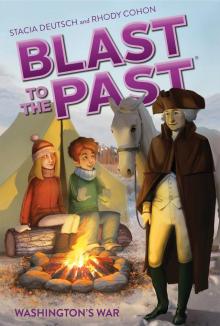 Washington’s War
Washington’s War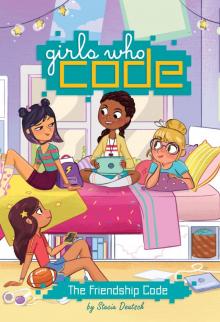 The Friendship Code #1
The Friendship Code #1 Spirit Riding Free: PALs Forever
Spirit Riding Free: PALs Forever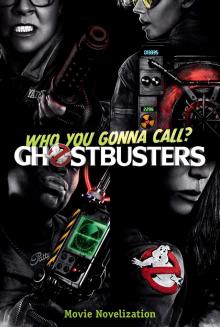 Ghostbusters Movie Novelization
Ghostbusters Movie Novelization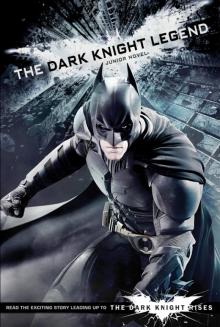 The Dark Knight Legend
The Dark Knight Legend Cinnamon Bun Besties
Cinnamon Bun Besties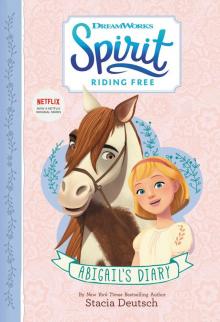 Spirit Riding Free: Abigail's Diary
Spirit Riding Free: Abigail's Diary Spirit Riding Free--Pru's Diary
Spirit Riding Free--Pru's Diary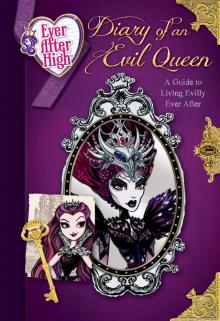 Diary of an Evil Queen
Diary of an Evil Queen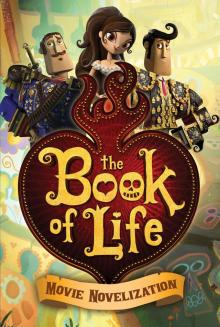 The Book of Life Movie Novelization
The Book of Life Movie Novelization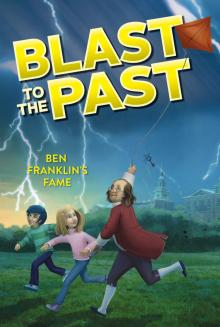 Ben Franklin’s Fame
Ben Franklin’s Fame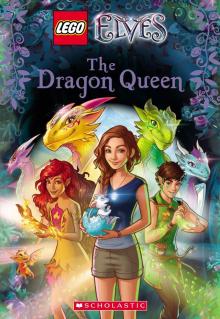 The Dragon Queen
The Dragon Queen Sacagawea's Strength
Sacagawea's Strength Team BFF--Race to the Finish! #2
Team BFF--Race to the Finish! #2 Spirit Riding Free: Lucky's Diary
Spirit Riding Free: Lucky's Diary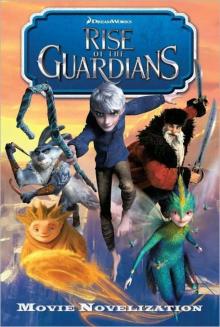 Rise of the Guardians Movie Novelization
Rise of the Guardians Movie Novelization Dragon Games
Dragon Games In the Stars
In the Stars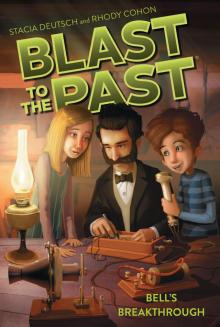 Bell’s Breakthrough
Bell’s Breakthrough